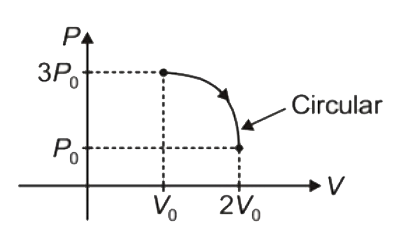Two moles of an ideal diatomic gas is taken through a process VT2= constant so that its temperature increases by ΔT=300K. The ratio (ΔUΔQ) of increase in internal energy and heat supplied to the gas during the process is
2
3
4
5
The correct Answer is:D
To solve the problem, we need to find the ratio ΔUΔQ for the given process where VT2=constant and the temperature increases by ΔT=300K.
Step 1: Identify the type of process
The process is described by the equation VT2=constant. This indicates that it is a polytropic process. We can express this in terms of pressure and volume as well.
Step 2: Use the ideal gas law
From the ideal gas law, we have:
PV=nRT
For 2 moles of an ideal diatomic gas, we can write:
P=nRTV
Step 3: Determine the specific heat capacities
For a diatomic gas, the specific heat at constant volume Cv is given by:
Cv=5R2
The specific heat at constant pressure Cp is:
Cp=Cv+R=5R2+R=7R2
Step 4: Determine the effective specific heat for the process
In a polytropic process, the effective specific heat C can be calculated using the relation:
C=Cv+R1−n
where n is the polytropic index. For the given process, since VT2=constant, we can derive that n=32.
Substituting n into the equation:
C=Cv+R1−32=Cv−2R
Substituting Cv=5R2:
C=5R2−2R=5R2−4R2=R2
Step 5: Calculate ΔQ and ΔU
The heat supplied to the gas ΔQ can be calculated as:
ΔQ=nCΔT=2⋅R2⋅300=300R
The change in internal energy ΔU can be calculated as:
ΔU=nCvΔT=2⋅5R2⋅300=1500R
Step 6: Calculate the ratio ΔUΔQ
Now we can find the ratio:
ΔUΔQ=1500R300R=5
Final Answer
Thus, the ratio ΔUΔQ is 5.
The process is described by the equation VT2=constant. This indicates that it is a polytropic process. We can express this in terms of pressure and volume as well.
From the ideal gas law, we have:
PV=nRT
For 2 moles of an ideal diatomic gas, we can write:
P=nRTV
For a diatomic gas, the specific heat at constant volume Cv is given by:
Cv=5R2
The specific heat at constant pressure Cp is:
Cp=Cv+R=5R2+R=7R2
In a polytropic process, the effective specific heat C can be calculated using the relation:
C=Cv+R1−n
where n is the polytropic index. For the given process, since VT2=constant, we can derive that n=32.
C=Cv+R1−32=Cv−2R
Substituting Cv=5R2:
C=5R2−2R=5R2−4R2=R2
The heat supplied to the gas ΔQ can be calculated as:
ΔQ=nCΔT=2⋅R2⋅300=300R
The change in internal energy ΔU can be calculated as:
ΔU=nCvΔT=2⋅5R2⋅300=1500R
Now we can find the ratio:
ΔUΔQ=1500R300R=5
Thus, the ratio ΔUΔQ is 5.
Similar Questions
Two moles of an ideal monoatomic gas undergoes a process VT= constant. If temperature of the gas is increased by ΔT=300K, then the ratio (ΔUΔQ) is
View SolutionIn the process pV2= constant, if temperature of gas is increased, then
View SolutionOne mole of an ideal monoatomic gas is taken through a polytropic process P2T = constant. The heat required to increase the temperature of the gas by ΔT is
View SolutionTwo moles of a diatomic ideal gas is taken through pT= constant. Its temperature is increased from T to 2T. Find the work done by the system?
View SolutionTwo moles of a diatomic ideal gas is taken through pT= constant. Its temperature is increased from T to 2T. Find the work done by the system?
View SolutionTwo moles of an ideal monatomic gas is heated at constant pressure so that its temperature increases from 127∘C to 227∘C , then work done by gas
View SolutionOne mole of an ideal diatomic gas is taken through a process whose P−V diagram is shown in the figure. The work done by the gas is

View SolutionAn ideal gas is taken through a process PT3= constant. The coefficient of thermal expansion of the gas in the given process is
View Solution
Two moles of an ideal monoatomic gas is taken through a cyclic process as shown in the P-T diagram. In the process BC, PT−2= constant. Then the ratio of heat absorbed and heat released by the gas during the process AB and process BC respectively is.
View SolutionWhich one of the following is correctly matched ?
View Solution

